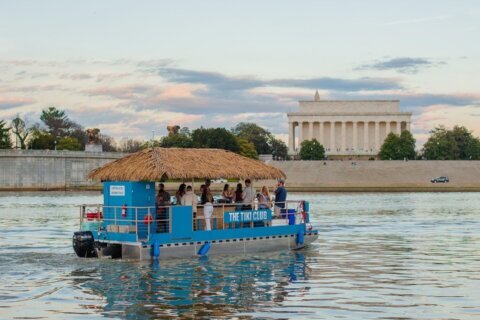A vast majority of people in the D.C. area believe human actions contribute “at least some” to climate change, and 92% agree that local leaders need to consider the impact of climate change when planning for transportation in the future.
Those findings are according to a survey conducted as part of Visualize 2045 — the federally mandated, long-range transportation plan for the National Capital Region.
The survey was done by the Metropolitan Washington Council of Governments Transportation Planning Board last fall. There were more than 2,400 responses, and the survey has a margin of error of +/- 2.5%. Analysis of the full effort still is underway.
“What should we be investing in now that future generations will thank us for in the future?” said Karen Armendariz, a public engagement specialist with the board.
The answer — more clean transportation options, according to respondents of the “Voices of the Region” survey.
“Creating infrastructure available for electric cars, for them to be practical to use around the region, and that includes having charging stations accessible,” Armendariz said.
The survey finds that after the pandemic, 90% of people teleworking now expect they’ll want to continue to do so either full or part time.
As for public transportation, ask riders whose use has declined what would make them more likely to go back a year after the pandemic, and the primary response included more spacing between people on busses or train cars, more frequent cleaning and more frequent service.
“We are delivering those things in spades,” said TPB member Shyam Kannan, vice president in the Office of Planning at Metro. “We are cleaning our vehicles much more frequently; we are providing sufficient space on the system for social distancing, and doing real-time information both at the bus shelters and on mobile devices.”
“So we are ready for you customers when you start going around again,” Kannan said.
Survey results indicate the use of personal vehicles for commuting is expected to rebound from 74% pre-pandemic to 72% expecting to be back in their cars one year after the pandemic.
Also, for general travel, 47% said they expect to drive less one year after the pandemic, and 34% expect to drive more.
Analysis of the study findings continues, and in January, 11 focus groups with people from three geographic areas — the inner suburbs, outer suburbs and core — were conducted.
Two sessions were with people who identify as racially or ethnically diverse, and others included people who identify as having low income, as having disabilities, people who are 60 years or older and young adults 18-24 of age. One session was done completely in Spanish.
You can find detailed survey results on this page. Click “complete meeting packet” and scroll down to agenda item No. 9.
- Sign up for WTOP alerts
- Latest coronavirus test results in DC, Maryland and Virginia
- Coronavirus vaccine FAQ: What you need to know
- Latest vaccination numbers in DC, Maryland and Virginia
- DC to open up COVID-19 vaccinations to grocery store workers, more
- Coronavirus variant first identified in Brazil detected in deceased Md. man
- Prince George’s County Public Schools announces return to in-person learning plans
Looking for more information? D.C., Maryland and Virginia are each releasing more data every day. Visit their official sites here: Virginia | Maryland | D.C.








